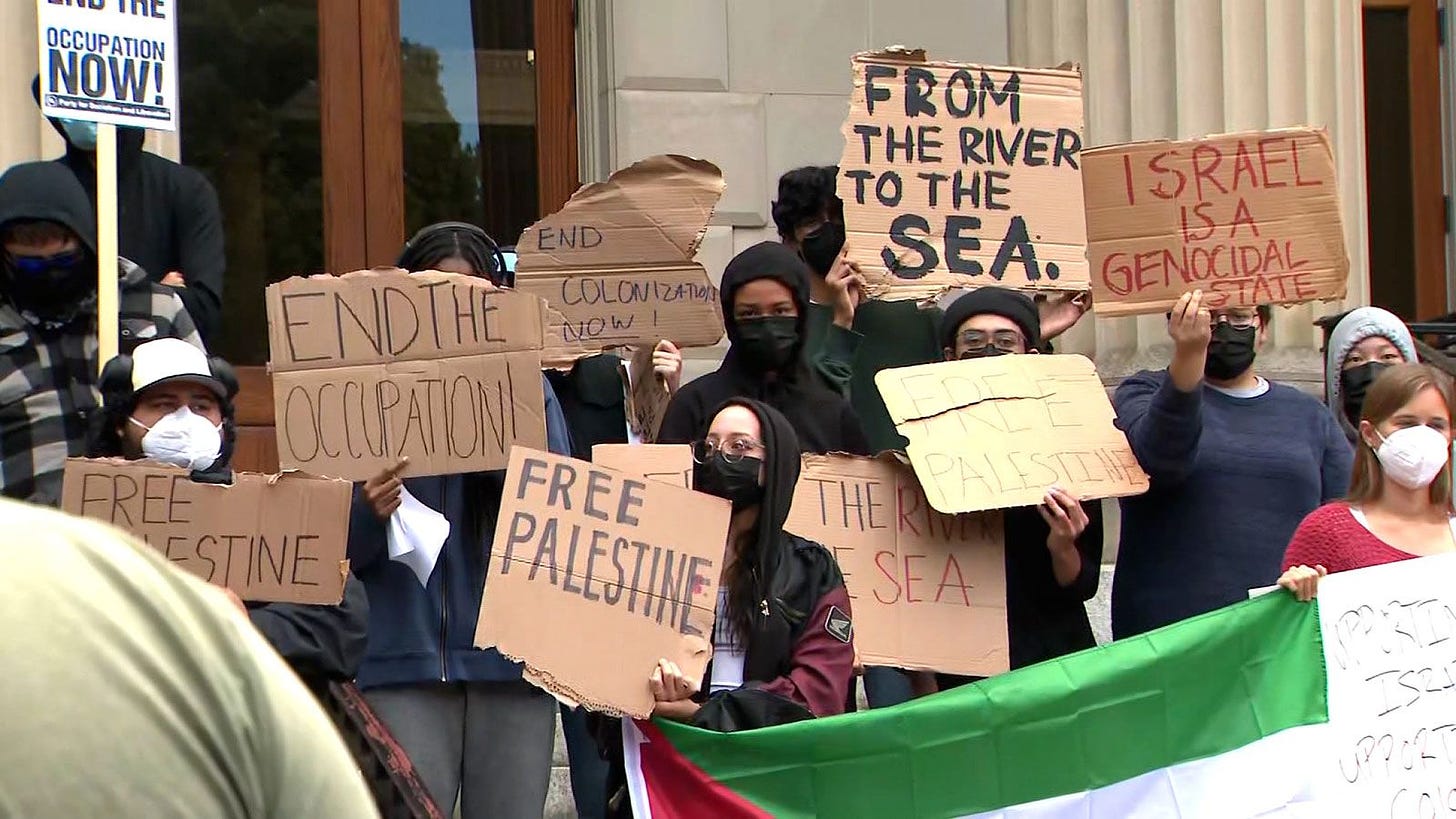Two Cheers for Cancel Culture
Voicing support for the violence of Hamas should be well outside the Overton window of a decent and free society, and should be met with social and professional consequences.

Nearly a month ago, the world was rocked by the devastating and evil attacks on the people of Israel by Hamas. Much of the world, in and out of Israel, was stunned by videos of Hamas terrorists paragliding into Israel, killing any in their path, and carrying women and children back to Gaza. But in the month since this devastating program, not all have responded with shock and horror.
At several American colleges and universities, student organizations have expressed solidarity with the Palestinians in Gaza and, arguably, support for the vicious attacks. At the University of Wisconsin-Madison, students demonstrated in support of Palestine, chanting, “Glory to the Martyrs,” “Glory to the Resistance,” and “We will liberate the land by any means necessary.” Other student organizations, such as those at Harvard University, issued formal statements blaming Israel for the violence.
One such statement came from Ryna Workman, the president of NYU Law School Student Bar Association. In it, Workman stated that “Israel bears full responsibility for this tremendous loss of life” and that she “[would] not condemn Palestinian resistance.” Workman’s statements did not go unnoticed. Workman’s future employer, prestigious Chicago-based law firm Winston & Strawn, released a statement that it had “learned that a former summer associate published certain inflammatory comments regarding Hamas’ recent terrorist attack on Israel and distributed it to the NYU Student Bar Association” and that it had “rescinded the law student’s offer of employment.” Workman’s statements have cost her dearly.
This move by Winston & Strong, and calls from individuals such as Bill Ackman for schools to release the names of students who have signed on to statements similar to Workman’s “to insure[sic] that none of us inadvertently hire any of their members,” has sent a seismic shock throughout the legal community. This has raised questions about the appropriateness of conditioning job status on the acceptability of one’s viewpoints and “cancel culture” more broadly. Despite the claims of hypocrisy, what has occurred here was a proper application of cancel culture and highlights the need for a virtuous cancel culture to defend a free and virtuous society.
What is cancel culture? Most often, what comes to mind is public shaming, calls for professional defenestration, and digital expulsion from society by self-righteous internet activists. But at a higher level, cancel culture is a response by individuals or society at large to comments or behavior deemed to be outside the Overton window of acceptable views and behavior. Or “social consequences for behavior and rhetoric any reasonable person would understand to be out of bounds of basic human decency,” as Freemen Foundation Executive Director Justin Stapley has put it.
This concept is not new. John Locke, in his Essay Concerning Human Understanding, called this concept “the law of fashion.” According to Locke, while individuals may not order their behavior to the laws of God or the law of political societies and rationalize that they will be reconciled or escape punishment, the law of fashion holds that:
[N]o man escapes the punishment of their censure and dislike, who offends against the fashion and opinion of the company he keeps, and would recommend himself to….This is a burden too heavy for human sufferance: and he must be made up of irreconcilable contradictions, who can take pleasure in company, and yet be insensible of contempt and disgrace from his companions.
-John Locke
According to Locke, most individuals “govern themselves, chiefly, if not solely, by this law of fashion.” J.S. Mill concurred. In On Liberty, Mill states, “Society can and does execute its own mandates.” Thus, societal norms and mores and the social cost of violating them—what we could call cancel culture—govern much of human behavior.
This “law of fashion” or cancel culture is vital to safeguarding a free and virtuous society. Advocates of a free and virtuous society largely believe that there is a limited scope of legitimate state coercion. As Thomas Jefferson stated, rightful force “extend[s] to such acts only as are injurious to others.” Thus, “laws provide against injury from others, but not from ourselves.” Thus, advocates of free and virtuous society say, “is all from which the laws ought to restrain him.” This leaves the state unable to respond to many social ills that may limit human flourishing or reduce social virtue. Or, more specifically, renders the state morally unable to proscribe activities such as blasphemy, pre-marital sexual relations, and lack of Sabbath day observance. Cancel culture, or “the law of fashion,” fills the void as it permits civil society to police behavior and viewpoints that weaken societal virtue without the use of state coercion.
Where force would be inappropriate to address individuals engaging in pre-marital relations, speaking blasphemy, opening their business on the Sabbath, or advocating for political or philosophical views contrary to the majority, these behaviors and viewpoints may be addressed through cancel culture in the form of individuals not associating with these individuals, not frequenting their businesses, or refusing to hire individuals who don’t comply with Judeo-Christian norms. This prompts individuals to comply with the true, the good, and the beautiful without force. While modern anti-discrimination laws may have removed some of these means, others remain to sustain views and behaviors conducive to a free and virtuous society.
But one can likely only give two cheers for cancel culture rather than a full-throated endorsement due to its amoral nature. Cancel culture is only as virtuous as the society and culture that wields it. When the good, the true, and the beautiful are no longer within the Overton window, cancel culture becomes a second front in an assault on the free and virtuous society. As Mill stated, if society “issues wrong mandates instead of right…it practices a social tyranny more formidable than many kinds of political suppression, since, though not usually upheld by such extreme penalties, it leaves fewer means of escape, penetrating much more deeply into the details of life.” Cancel culture, like fire, is a dangerous servant and a fearful master.
This form of cancel culture is what we are most familiar with. In the last eight years, we have seen cancel culture leveled not only against views outside the Overton window, such as white supremacist or neo-Nazi views, but against mainstream views on sexuality, gender, and the role of government held by Jews, Christians, Moslems, and right-of-center Americans. There has been a blur of the lines between someone asserting that one race is superior to another and another person asserting that marriage is between a man and a woman. Thus, we see that great care must be taken to ensure that the Overton window in society is aligned as much as possible with the good, the true, and the beautiful and that the power of cancel culture is not used irresponsibly.
The actions of Winston & Strawn and the efforts of Bill Ackman are examples of the proper application of cancel culture rather than the cancel culture of the last eight years. This is not to say that anything less than full-throated support for Israel justifies the exercise of cancel culture. There is ample space within the Overton window of acceptable viewpoint and behavior to debate and critique aspects of Israeli government policy, the merits of a two-state solution, and sympathizing with the plight of Palestinian civilians in the Gaza Strip. But the activities and views advocated by the student organizations at Harvard or by Workman go beyond that.
Assigning all blame for life loss to Israel, in the face of videos and images published by Hamas that depict the murder of concertgoers, entire families in their homes, and the murder of children, is far outside the Overton window of acceptable behavior and viewpoints. Not only do the positions advocated by these students defy logic and the facts on the ground, but, even more importantly, they suggest that Israeli behavior has justified the murder and abuse of civilians, specifically the killing of women and children. Oppression, real or imagined, does not and cannot justify violence against innocent men, women, and children living their lives.
A society that treats viewpoints such as these as valid and welcome cannot last, as it introduces rhetorical justification for spectacular levels of violence and barbarity. In our age of grievance, where violence against property and persons has been justified by evils decades earlier, the danger is even greater.
Therefore, while the dangers of cancel culture, especially when weaponized against the good, the true, and the beautiful, exist, those who desire a free and virtuous society must be willing to prudentially engage in it. Our future depends on it.
Jacob Hibbard is a Juris Doctorate candidate at Brigham Young University Law School, and Senior Editor of BYU Law Review. He received his Bachelor’s Degree in Political Science from Brigham Young University. @hibbardj
The Freemen News-Letter is an online media publication effort of the Freemen Foundation, a non-profit effort to conserve and renew American constitutionalism. Please consider a donation to our efforts.




I largely agree with you on a philosophical level but quibble with a semantic point. The term “cancel culture” was introduced in the 2010s largely to refer to a specific phenomenon:
“ In the last eight years, we have seen cancel culture leveled not only against views outside the Overton window, such as white supremacist or neo-Nazi views, but against mainstream views on sexuality, gender, and the role of government held by Jews, Christians, Moslems, and right-of-center Americans.”
Calling the social enforcement of long-held societal norms by institutions and individuals “cancel culture” feels like conceding a stolen base to the people who were in favor of cancel culture for eight years and now want to rediscover free speech when some lefty kids express support for terrorism (or to civil libertarians who want to pretend the right and left are equal opportunity offenders).
It might also be useful to explore the clash between property rights and associational rights on the one hand and expressive rights on the other, as well as to add in a disclaimer about governmental restrictions on speech vs. private actors’ restrictions. These additions to the argument would go a long way towards demonstrating that there is a coherent set of principles which inform your conclusions (and mine) on the specifics of various instances of “cancel culture.” Left-wing critics will claim the only principle is: opposition to cancel culture when the left is doing the canceling and preference for cancel culture when the left is getting canceled (or, free speech for rightists but not for leftists). But that isn’t true.
Two thoughts:
The New York Times fired James Bennet for running an editorial written by a sitting US Senator, Tom Cotton. Winston and Strawn essentially "fired" Workman for supporting the atrocities of October 7th. Thinking these two show one within and one without the overton window. Bennett should have been retained and Workman deserved her fate.
But second, both the Times and the law firm are non governmental entities. The Sulzberger's and the Law Partners should be able to hire and fire as they see fit (assuming no discrimination laws were broken).